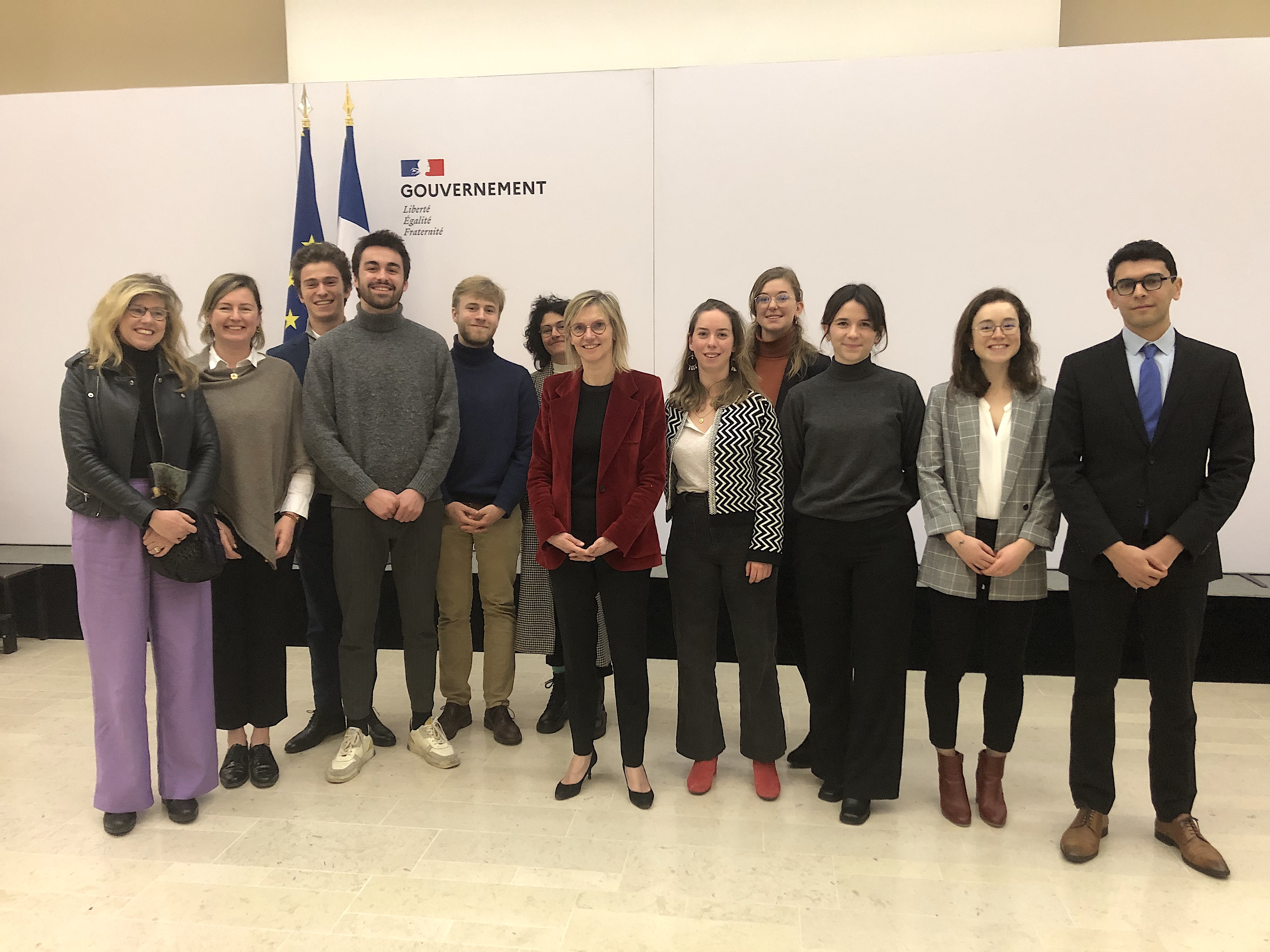Energy mix: Agnès Pannier-Runacher faces HEC Transition proposals

French Ministry of Ecological Transition has welcomed ten HEC students and young graduates last Monday. An opportunity for them to share the 15 recommendations they developed for a sustainable energy plan with the Minister of Energy Transition and the Minister of Higher Education. Also, they have a message regarding the years to come.
Under Hôtel de Roquelaure’s elegant arcades, home of the Ministry for Ecological Transition, groups of students are silently rehearsing one last time before their imminent intervention. There is a palpable air of nervous excitement in the room as they are waiting for French Minister Agnès Pannier-Runacher (H.95), and her colleague Sylvie Retailleau, in charge of Higher Education and Research.
On this day, Monday March 6th, prestigious schools (HEC, Dauphine, Science Po, IPAG) and regional universities (Bretagne Sud, Poitiers) are received at the Ministry for Ecological Transition, and energy mix is topic of the day. HEC Transition, an activists club with a goal for a greener and fairer world, is present. Supported by François Collin (H.87), Chief Sustainability Officer at HEC Paris, ten committed students and alumni stood out last January after sending 15 proposals for a sustainable energy strategy for France. “We’re not experts, but the acclaimed reputation of our school allows us to get a message across,” says Zoë Bantignies-Le Bars (M.23), co-editor of the document submitted to the ministry.
“You are the ones that will lead the energy transition”, says Agnès Pannier-Runacher, unequivocally. The minister is not hiding from the fact that she has also come here to recruit. She is, for instance, currently struggling to find suitable candidates to handle projects on renewables. “We are looking for talents. If you brought your CV with you today, do not hesitate”, she said in conclusion, smiling. Her ministry will have to create 100,000 jobs to achieve the goals of the transition. For Sylvie Retailleau, the environmental crisis can be perceived “as something catastrophic, but also as energizing, when you are 20, to you have the power to change the world.” A clear statement for those about to take the stand.
Shedy Guiga (H.20) and Valentine Japiot (H.23), from the HEC Transition Club, were the one presenting their take on the matter. Energy renovation and following stringent policies for biomass resource exploitation were some of the most brought up points. They used their speech to firmly call for energy independence, with our reliance on imported sources having dreadful social and economic consequences. While the two ministers were assiduously taking notes, the duo raised the importance to abandon the never-ending debate opposing nuclear power to green energy. Guiga’s conclusion surely was punchy: « I would like to make it clear that, today, we are not the actors. You are. », he said, calling out to the members of the government before him.
We can almost feel two different perspectives clashing here, involving two generations of HEC students. “Our responsibility is to get all the generations to speak together and to give a voice to those who will suffer the consequences of our decisions,” says Agnès Pannier-Runacher. Recalling her youthful liberal commitment, she reacts to Shedy Guiga’s exhortation : « It’s a way to cope with eco-anxiety, which is real and is not a creation of the mind, for many young people. » She says she appreciates a young voice that is “more original and invigorating than that of people who are part of my generation or my parents’ generation. »
After this first opportunity at Hôtel de Roquelaure, Valentine Japiot, a master student enrolled in the PIC Innovation program, is already looking forward to the next step. “It would be interesting to see how we’re going to participate in the sobriety plan and if it is the end or the beginning of something.” HEC Transition members remain touched by the minister’s involvement. « We can see that she can keep up with what has been presented today,” says Shedy Guiga. It’s pretty positive to see someone being invested in the reading and the feedbacks.” In the future, he says he wants to work in the electricity sector. “We know the big steps: nuclear power, renewables and flexibilities in terms of decarbonation. How do we get there ? That’s what interests me. »
This meeting was held as part of the major national consultation on the energy mix launched by the ministry last October. The summary report should be presented later this week. Despite the tight deadlines, National Commission for Public Debate’s guarantor has assured us that she will take the students’ contributions into account.
Published by Estel Plagué

